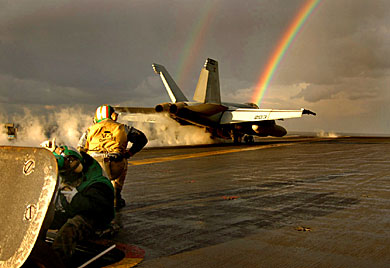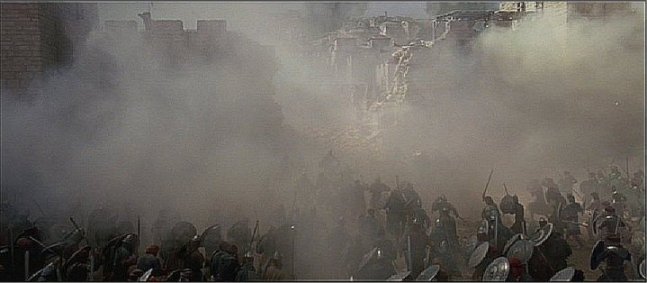Air Force's New Rules on Religion Called Unconstitutional

As the Navy and the Army are being petitioned to allow their chaplains to pray as the chaplain's religious order teaches, the Air Force which does not restrict their chaplains is being sued for allowing them to do so.
The Air Force submitted new guidelines on religion as part of its fight against a lawsuit by an Air Force Academy graduate who purports that the school's officers and cadets illegally impose Christianity on others.
The Justice Department has asked a U.S. District judge to dismiss the lawsuit, arguing that the Air Force has no official policy of proselytizing.
But attorney Sam Bregman, who sued the Air Force on behalf of Mikey Weinstein of Albuquerque, said yesterday that dismissing the lawsuit would be "ridiculous in light of what the new guidelines say."
"They completely, thoroughly violate the Constitution of the United States," he said.
How the practice of allowing free expression of standard religious practices on the part of personnel hired for that purpose violates the Constitution is curious. If generic religion was all we could experience in public then we would have a state religion indeed.
.
The guidelines, labeled as interim, say superiors must be sensitive to the potential that personal expressions of faith might appear to be official or have undue influence on subordinates.
But what an evangelical officer may feel is a reasonably sensitive discussion, an enlisted atheist may feel is completely unreasonable, Mr. Weinstein and Mr. Bregman contend.
The guidelines also say the Air Force respects "the right of chaplains to adhere to the tenets of their religious faiths" by not requiring them to participate in religious activities, including prayer, inconsistent with their faith.
Mr. Weinstein said that "gigantic exception" would, for example, allow evangelical Christians to pray in the name of Jesus Christ at mandatory formations and other official events.
Mr. Weinstein is complaining that the officers of a particular religion are free to practice their religion. Allowing others to freely execute their belief does not constitute denying others to also do so with the exception of an overt act such as Jihad. Mr. Weinstein's reaction is not very far removed from the reactions of Radical Moslems to even the slightest hint of blasphemy by the most strenuous of actions.
We cannot take citizens from their home and family to defend our nation and expect them to leave their religion at home also. That is why the services have chaplains. There are chaplains for all faiths and service members are free to seek the help and advice of chaplains or choose not to. There are times when public gatherings feature a prayer or some other religious practice. Simply being exposed to one that the individual does not adhere to would not have undue influence on that individual unless it began to make sense. Otherwise his own convictions seemingly would be sufficient for him to view it in respectful silence








 BlogHop.com
BlogHop.com







1 Comments:
|>>If generic religion was all we could experience in public then we would have a state religion indeed.<<
Put another way the absence of a thing is a thing in itself - a void if you will. So any restrictions placed upon religious expression by the Government is an "establishment" and so violates the Constitution.
Now I suppose we can discuss what constitutes religious expression - one persons rock crystal is anothers Torah......
Post a Comment
<< Home